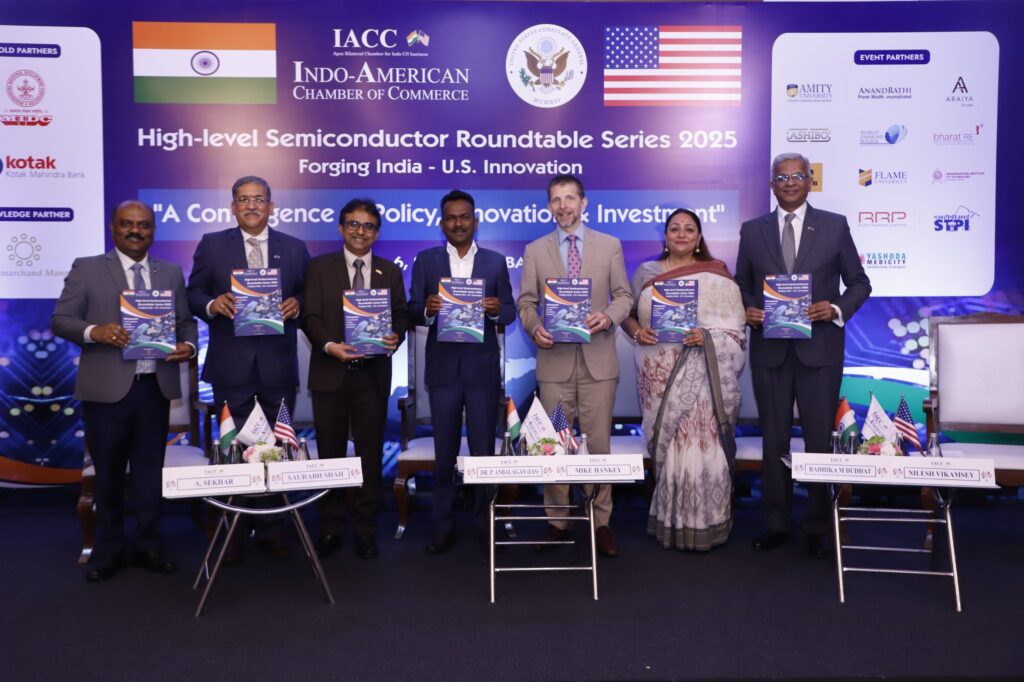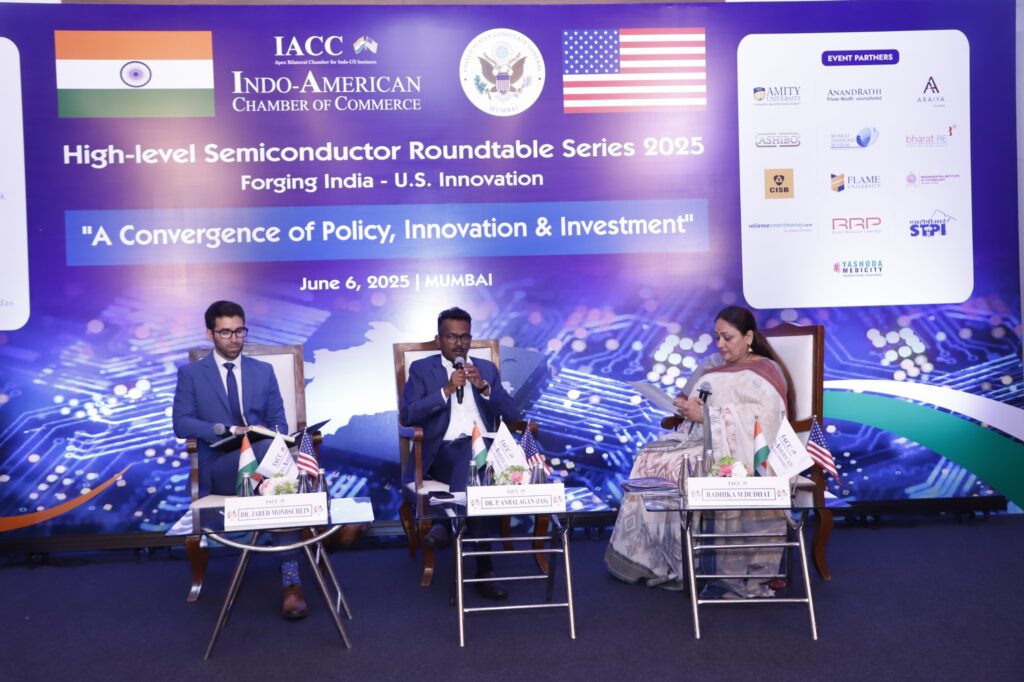Indo-American Chamber of Commerce Concludes National Semiconductor RoundtableSeries 2025 with Grand Finale in MumbaiLandmark event draws senior leadership from India and the U.S., releases strategicwhitepaper to shape India’s semiconductor future

by Prashant Kapadia /NHN
Mumbai, June 6 — The Indo-American Chamber of Commerce (IACC), in collaboration with
the U.S. Consulate General, Mumbai, and Knowledge Partner Shardul Amarchand
Mangaldas & Co., concluded the Grand Finale of the Semiconductor Roundtable Series 2025
at the Jio Convention Centre, BKC, Mumbai. Titled “Forging India–U.S. Innovation”, the
roundtable series was a national-level initiative aligned with India’s Viksit Bharat @2047
vision — aimed at transforming the country into a technology-driven developed economy.
Spanning four Indian cities—Mumbai, Nagpur, Pune, and Ahmedabad—the roundtables
brought together over 300 stakeholders from central and state governments, the U.S.diplomatic mission, academia, financial institutions, and leading technology companies.
Through each session, the series aimed to build consensus around India’s strategy for
semiconductors, focusing on long-term ecosystem development, industry-academia
collaboration, infrastructure, and innovation funding.
Laying the Foundation: India’s Semiconductor Vision Opening the Finale, Mr. Saurabh Shah, Chairman of the IACC National Committee on Ease of Doing Business, emphasized the strategic relevance of semiconductors in India’s long-term economic aspirations.
“As we work toward the goals of Viksit Bharat @2047, semiconductors represent not just an
industry but an enabler of national self-reliance. This series has not just generated ideas; it has
mapped clear action points. Maharashtra is ideally positioned to be a launchpad for India’s
semiconductor leap,” he said. In his address, Mr. A. Sekhar, National President of IACC, reflected on the Chamber’s mission
to be a catalyst for Indo-U.S. innovation.
“Semiconductors are foundational to India’s technology sovereignty. Our engagements
through this roundtable series have strengthened cross-sectoral ties and created a practical policy roadmap for the sector’s growth,” he stated. He acknowledged the crucial support of the U.S. Consulate General and thanked participating states, particularly Maharashtra, for their proactive approach.
U.S.–India Technology Partnership in Action
Mr. Mike Hankey, Consul General, U.S. Consulate General Mumbai, delivered the Keynote Address, underlining the role of strategic tech diplomacy in advancing both nations’ economic goals.

“The semiconductor industry is central to global innovation, and India—especially Western
India—is poised to play a defining role,” he said.
Mr. Hankey also emphasized the significance of the TRUST Initiative (Transforming the
Relationship Utilizing Strategic Technology), launched earlier this year by President Trump and Prime Minister Modi, which guides the U.S.–India collaboration on critical and emerging echnologies including AI, clean tech, and semiconductors.
Whitepaper Release: A Roadmap for Ecosystem Development The event featured the formal release of the IACC Semiconductor Whitepaper, a policy- oriented document informed by months of roundtable discussions. Developed by Shardul Amarchand Mangaldas & Co., the whitepaper identifies actionable frameworks across seven
key pillars:
• Awareness & Outreach
• Skilling & Education
• Investment Enablement
• Incentives Across the Value Chain
• Research & Innovation
• Supply Chain & Logistics
• Technology Partnerships & IP Facilitation
It recommends strategic interventions such as establishing skilling hubs in Tier-II and Tier-III
cities, incentivizing semiconductor-linked start-ups, aligning state policies with central
schemes like the India Semiconductor Mission (ISM), and facilitating public-private R&D
partnerships. The whitepaper also suggests that Maharashtra could develop as a key
semiconductor cluster with focused infrastructure in Pune and nearby industrial belts.
Maharashtra’s Policy Leadership
Delivering the Chief Guest Address, Dr. P. Anbalagan (IAS), Principal Secretary (Industries), Government of Maharashtra, laid out the State’s vision to build a globally competitive semiconductor hub.
“Maharashtra is working to ensure clean water, reliable power, skill development, and special
incentives for semiconductor investments. We are committed to facilitating the entire value
chain—from R&D and design to packaging and logistics,” he said. Fireside Chat: Global Perspectives on India’s Fabless Future
The whitepaper launch was followed by a dynamic Fireside Chat on “Blueprints for the Future: Building India’s Fabless & Deep Tech Semiconductor Ecosystem”, featuring:
• Dr. Jared Mondschein, Policy Advisor, Office of the Special Envoy for Critical and
Emerging Technology, U.S. Department of State
• Dr. P. Anbalagan, IAS, Principal Secretary (Industries), Government of Maharashtra
• Moderator: Ms. Radhika M. Dudhat, Partner, Shardul Amarchand Mangaldas & Co.
Dr. Mondschein shared the U.S. perspective on operationalizing TRUST and emphasized the
importance of joint talent development, tech transfer frameworks, and licensing pathways to
enable scalable and secure semiconductor ecosystems.
“India’s ambitions align closely with U.S. priorities. The foundation is strong — what’s needed now is structured, sustained engagement,” he noted. Financial Strategy Session & Industry Recognition
The day also featured a knowledge session by Ms. Nidhi Kaushik, Senior Vice President –
Treasury & Forex Management, Kotak Mahindra Bank Ltd, who offered strategic insights into
treasury and forex tools that can empower semiconductor sector investors in navigating
market volatility and regulatory environments.
During a felicitation ceremony, Dr. Anbalagan and Mr. Hankey were presented with plaques
by Mr. A. Sekhar and Mr. Saurabh Shah, in recognition of their visionary contributions to
strengthening Indo-U.S. technology partnerships.
A Grateful Close In his Vote of Thanks, Mr. Nilesh Vikamsey, Regional President, IACC – West India Council, acknowledged the relentless efforts of the IACC Secretariat, Knowledge Partner, sponsors, and organizing teams across all cities.
“This series exemplifies how collaborative leadership can bring national agendas to life. We hope this whitepaper becomes a working document for the government, industry, and
investors alike,” he said.
The Road Ahead As the Semiconductor Roundtable Series 2025 comes to a close, the message is clear: India’s semiconductor ambition is no longer a vision — it is a mission. With the right convergence of policy, partnerships, and innovation capital, India is poised to rise as a trusted and competitive
force in the global semiconductor value chain